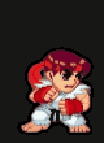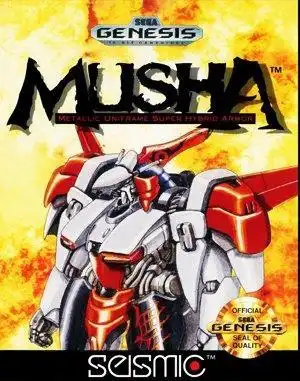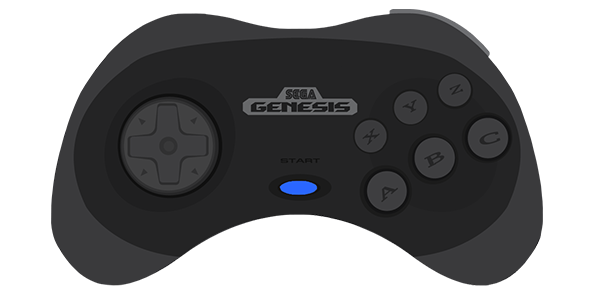Few games ignite the passion of retro gamers quite like a truly exceptional shmup (shoot 'em up). And when you talk about the creme de la creme on the Sega Genesis, one title often rises to the top of the conversation: M.U.S.H.A. Sega Genesis. This isn't just another shooter; it's a frantic, beautiful, and challenging experience that defined what the genre could be on Sega's 16-bit powerhouse. Dive into the legendary M.U.S.H.A. on Sega Genesis! Explore why this vertical shooter is a retro gaming classic, its intense gameplay, stunning visuals, and iconic soundtrack.
Let's fire up the ol' Genesis and take a trip back to a time when dodging bullets and collecting power-ups was life itself.
What Makes M.U.S.H.A. a Genesis Legend?
Released in 1990 by Compile (a name synonymous with quality shooters), M.U.S.H.A. (an acronym for "Metallic Uniframe Super Hybrid Armor") threw players into the cockpit of a transforming mech suit. The mission? Stop a rogue AI named Dire 51 from wiping out humanity. While the story is typical sci-fi fare, the gameplay is anything but.
M.U.S.H.A. stands out for several key reasons:
- Incredible Pace: The action is relentless from start to finish. Enemies swarm the screen, bullets fill the air, and bosses are huge, multi-part challenges.
- Deep Power-Up System: Collecting "P" chips levels up your main weapon, but the real fun comes from the three distinct special weapons (Blazer, Spear, Shield) and the option satellites that mirror your movement or offer fixed fire. Finding the right combination for each stage is crucial.
- Strategic Options: Unlike some shmups where options are just extra firepower, M.U.S.H.A.'s options can be strategically positioned around your mech, adding a layer of tactical depth.
- Fair, But Tough: It's a challenging game, no doubt, requiring quick reflexes and memorization. But it rarely feels cheap. Deaths usually come from player error, not unfair design.
It's this combination of speed, depth, and challenge that cemented M.U.S.H.A.'s reputation among discerning shooter fans.
The Look and Sound of a Classic
Beyond the mechanics, M.U.S.H.A. is a feast for the senses on the Genesis.
- Visual Spectacle: Compile pushed the Genesis hardware. The backgrounds are detailed and varied, featuring impressive parallax scrolling (check out those multi-tiered lava canyons!). The enemy and boss designs are creative, and the explosions are satisfyingly chunky. The graphical effects, like transparent clouds, were cutting-edge for the time.
- That Soundtrack: Oh, the soundtrack! Composed by Toshiaki Sakoda, M.U.S.H.A.'s music is legendary. It's a driving, energetic mix of synths and percussion that perfectly complements the on-screen action. It's the kind of music that gets your adrenaline pumping and sticks with you long after you've turned off the console.
The cohesive presentation, where graphics, sound, and gameplay work together seamlessly, is a major reason why M.U.S.H.A. feels so polished and premium.
Part of the Aleste Legacy?
M.U.S.H.A. is often considered part of Compile's long-running Aleste series, though its connection is somewhat debated. While it shares gameplay similarities and certain musical cues with earlier Aleste titles (like Space Harrier or Power Strike), its futuristic mech setting differs from the more traditional spaceship themes of the main series. Regardless of where it fits precisely in the Aleste canon, it's undoubtedly a high point in Compile's shooter output and a spiritual successor in quality if not direct narrative.
Reliving the M.U.S.H.A. Magic Today
For many years, experiencing M.U.S.H.A. meant tracking down an original Genesis cartridge, which can command high prices in the collector's market. Thankfully, retro gaming has become more accessible:
- Emulation: Playing via emulators like Kega Fusion or Genesis Plus GX is a popular and accessible way to experience the game on modern platforms.
- Nintendo Switch Online: M.U.S.H.A. is included in the Sega Genesis library available through the Nintendo Switch Online + Expansion Pack service, offering an official way to play on modern hardware.
However you choose to play, experiencing M.U.S.H.A. today is a reminder of the peak of 16-bit shooter design.
Final Thoughts
M.U.S.H.A. on the Sega Genesis isn't just a great shmup; it's a masterclass in game design from the era. Its relentless pace, strategic depth, fantastic visuals, and iconic soundtrack combine to create an unforgettable experience. It's a game that demands your full attention and rewards mastery. If you consider yourself a fan of retro shooters or just want to experience one of the best Genesis games had to offer, M.U.S.H.A. is an absolute must-play. It truly is a metallic, super-hybrid armor of a game that stands the test of time.
M.U.S.H.A. Sega Genesis FAQ
Q: Is M.U.S.H.A. a difficult game? A: Yes, M.U.S.H.A. is known for its high difficulty, typical of many classic arcade-style shmups. It requires practice, memorization of enemy patterns, and quick reflexes.
Q: How long is M.U.S.H.A.? A: Like most vertical shooters of the era, M.U.S.H.A. is relatively short, consisting of seven stages. A single playthrough might take around 30-45 minutes once you can get through it, but mastering it takes much longer.
Q: Is M.U.S.H.A. related to the Aleste series? A: M.U.S.H.A. is widely considered a spin-off or part of Compile's Aleste series, sharing gameplay mechanics and some thematic elements, though its specific setting and narrative differ from the main Aleste titles.
Q: Why is the original M.U.S.H.A. cartridge expensive? A: M.U.S.H.A. had a relatively limited release in North America compared to other Genesis titles and is highly sought after by collectors due to its quality and rarity. This high demand drives up the price of physical copies.


